Vasiliki Karayanni
Vassiliki Karayanni is among the top Greek sopranos of all times. Her technical prowess is unquestionable. With precision and ease, she navigates even the most intricate musical passages, maintaining full control of her exquisite voice over the musical creations of the greatest composers. Beyond her technical brilliance, Vassiliki Karayanni penetrates the characters she embodies with unique ability, transporting the audience on a dreamlike journey in a way that only great artists can.
Lambros Mitropoulos
"I lived for art, I lived for love." "Vissi d'arte, Vissi d'amore," says Tosca, but I would say for love in a broader sense. We can mean romantic love, but not only on a personal level. Love is everything and is everywhere. It's in nature, in life, in friendships, in family."
Vassiliki Karayanni
With great joy and emotion, we welcome the distinguished Greek soprano Vassiliki Karayanni to the Radio of Art.
Vassiliki Karayanni is a leading soprano on our lyrical stage, having performed in a plethora of productions in Greece and in the world's major lyric theaters, such as La Scala in Milan, the Royal Opera House in London, and others.
Her performances are a true delight for the audience.
The talent of Vassiliki Karayanni goes beyond soprano coloratura repertoire. She has successfully tackled a variety of roles, from the brilliant characters in the operas of W.A. Mozart and the bel canto style to the most dramatic and complex roles in the operas of Giuseppe Verdi and Richard Strauss.
It is no coincidence that the Greek National Opera, in its commemorative program that culminated on September 16, 2023, at the Herodes Atticus Odeon, to celebrate the 100th anniversary of Maria Callas' birth, chose Vassiliki Karayanni along with distinguished sopranos of international acclaim, Anna Pirozzi, Catherine Foster, and Nina Minasyan, to interpret those arias that Callas marked with her performances in the historic appearances at the Herodes Atticus Odeon in 1944 and 1957.
In my opinion, Vassiliki Karayanni is the leading Greek soprano of her generation and will continue to captivate the audience not only in Greece but also around the world for many more years.
Below, we present the interview she granted us, as well as a brief biography after the interview's conclusion.
G.E.: Ms. Karayanni, we welcome you to "Radio Art." It is a great pleasure for me and the entire team to have the opportunity for this interview. Thank you very much!
B.K.: Thank you very much, too, Ms. Eftaxia.
G.E.: What led you to dedicate your life to the grand art of opera?
B.K.: I have always loved music, and as far back as I can remember, I enjoyed singing. I recall being 5 or 6 years old and thinking how wonderful it would be if there were a theater where instead of speaking, we would sing. The instinct was there. However, the turning point came when I went to a concervatory for the first time at the age of 7 to start accordion lessons. Three years later, at the age of 10, I heard a vocal lesson from the next room. Around the same age, I saw opera for the first time on television, specifically the opera "La Gioconda" and it impressed me. When I was 14 years old, I earned my accordion degree. Following the advice of my theory lessons teacher, I then began vocal lessons. What I felt during my first vocal lesson was unlike anything else. That's when I decided to pursue the art of opera. Along the way, I started buying records and listening to Maria Callas. This made me very selective about my musical tastes and disciplined with myself. I wanted to work hard and improve.
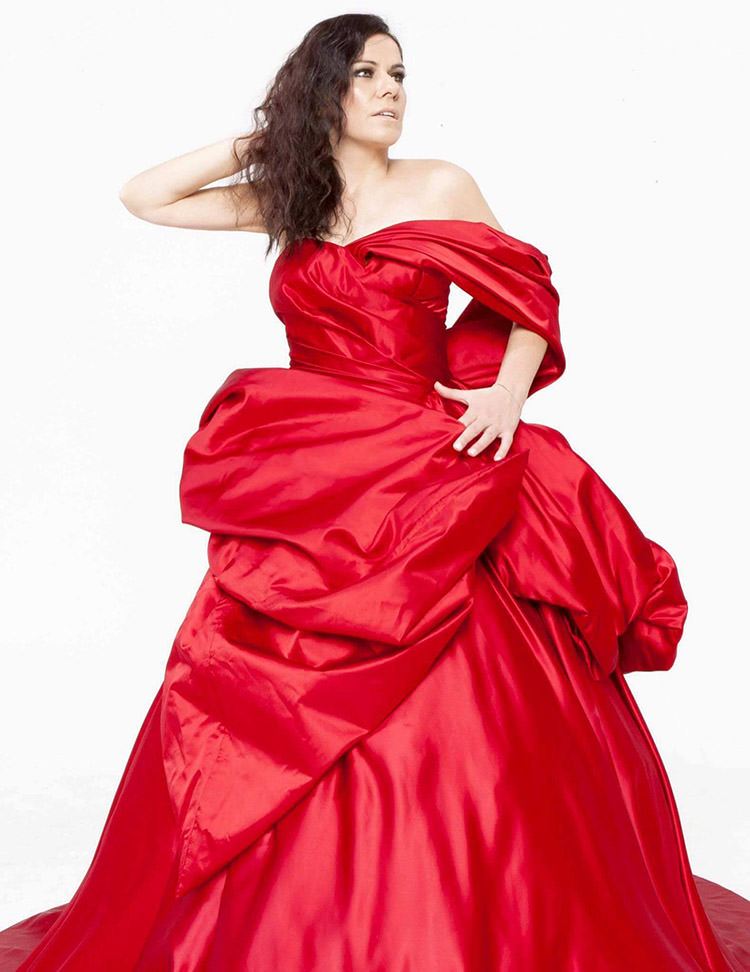
G.E.: What has been the biggest challenge you've faced in your professional career up to this point?
B.K.: First and foremost, being involved in opera is a challenge from beginning to end. Each role is a challenge, even if you've played it before, because each time it involves a different direction, cast, and orchestra. For me, a significant challenge was having to portray four different characters in the opera "The Tales of Hoffmann." I had to sing something that is sung by three different sopranos, by three different women with distinct voices, and of course, I had to study and embody four different characters, each with its own personality, while leaving my own mark. This requires different gestures, expressions, and vocal demands. All of this had to be done in a way that's clear and understandable to the audience within a three-hour performance. Another major challenge for me was performing at La Scala in Milan. I was invited to prepare and perform within a short timeframe for one of the most demanding audiences in the world. But I want to emphasize what I said at the beginning: being involved in Art in general and coexisting with it is a challenge.
G.E.: Do you believe that the artists and the audience are two different worlds, or are they connected in some way?
B.K.: It's exactly as you said. They are indeed two different worlds. However, during the creation and performance, the audience is open to receiving, and the artist is open to giving. Thus, at that moment, a union is formed among those who are open to experience it. I believe they are interconnected worlds. It's an exchange of emotional pleasure. The audience chooses to attend a performance not just to have a good time, but to let their soul travel through their senses. The artist provides this opportunity to the audience, and those who are open to it, receive it. This relationship is incredible. As an artist, I feel when the audience is open to receiving what the artist wants to convey through their soul and when it's not, and it's crucial to know this. For me personally, my purpose is my relationship with the audience. To interpret the best way I can, to transmit what I feel to others. This is the essence of art, and certainly opera, which encompasses all forms of art. In summary, my purpose as an artist is to move the audience, and I sense this during the creation, and I receive it through applause, and of course, when after the performance, people tell me that I moved them and thank me. That is extremely important to me. It's the most important thing.
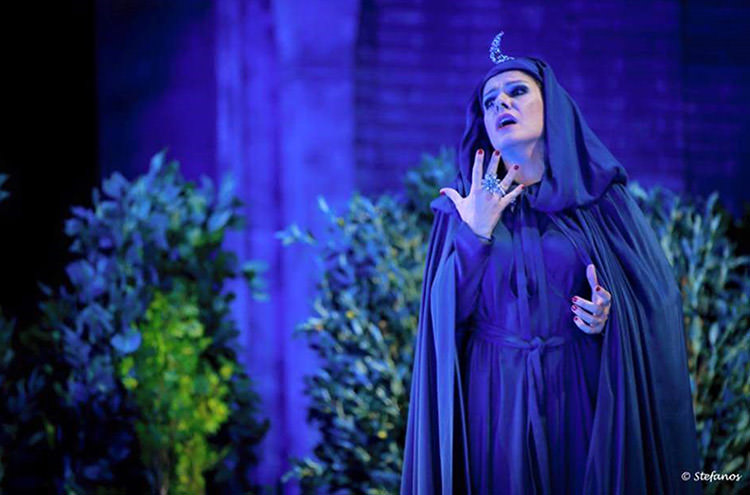
Vasiliki Karayanni in the role of the Queen of the Night in the play 'The Magic Flute' by W.A. Mozart.
G.E.: Studying your biography, I noticed that the first role that enchanted you was that of the Queen of the Night from Mozart's opera "The Magic Flute." It feels magical that this role has defined a significant part of your career. Do you believe it could be considered karmic?
B.K.: Yes, one could say that. If one notices certain signs in his life, he can't know in advance if these signs are karmic, but he realizes it afterward. In fact, now that you mention it, a few days ago I was looking through a photo album and found a picture from a carnival when I was 9 years old, dressed as the Queen of the Night. It wasn't inspired by anywhere; my mother had actually sewn the costume herself. It was entirely coincidental. Incredible...
G.E.: Perhaps, in the end, Ms. Karayanni, it wasn't all that coincidental. Maybe it was a sign.
B.K.: Yes, indeed. I saw the photo and never made the connection. The truth is that this role had fascinated me since I was little. I had seen the movie "Amadeus," where there's a scene describing how Mozart was inspired to create the aria for the Queen of the Night. Of course, it impressed me, but I couldn't have imagined that after a few years, it would become my first major role, and as you mentioned, that this role would define a significant part of my career, performing it in many major theaters. So, yes, it wasn't coincidental.
G.E.: The core content of Radio Art is music and poetry. Can the presence of this couple elevate art to such levels that it indelibly marks the quality of the human soul?
B.K.: Of course, it can, because both forms of art are magnificent. For me, this has already happened. First and foremost, there are many poems that have been set to music by great foreign composers, such as Schubert, Fauré, and Ravel. Poems by significant Greek poets like Seferis, Ritsos, and Gatsos have also been set to music. Indeed, focusing on the relationship of opera with poetry, if we think carefully, opera is essentially the evolution of ancient Greek tragedy. Most themes of early opera works were inspired by ancient Greece and its tragedies, drawing from ancient myths. Opera, in essence, is a fusion of poetry and music. As I mentioned before, I believe that opera, without intending to diminish other arts, is the pinnacle of the arts because it precisely combines all forms of art – speech, music, dance, and theater.
Opera itself is based on a theatrical work. At times, it's based on a poem. All these elements create a piece of immense size, which can undoubtedly touch the human soul. For me, opera and art, in general, are the soul. Without a soul, I don't believe anyone can sing. It's precisely at this point that Callas made the significant distinction. She was the greatest performer of all time. She didn't just play the roles; she became the role. Through each character, she conveyed her emotional state, all her emotions, and the situations she experienced. She managed to divide the history of opera into the pre- and post-Callas eras. It's overwhelming. It's a testament of the soul.
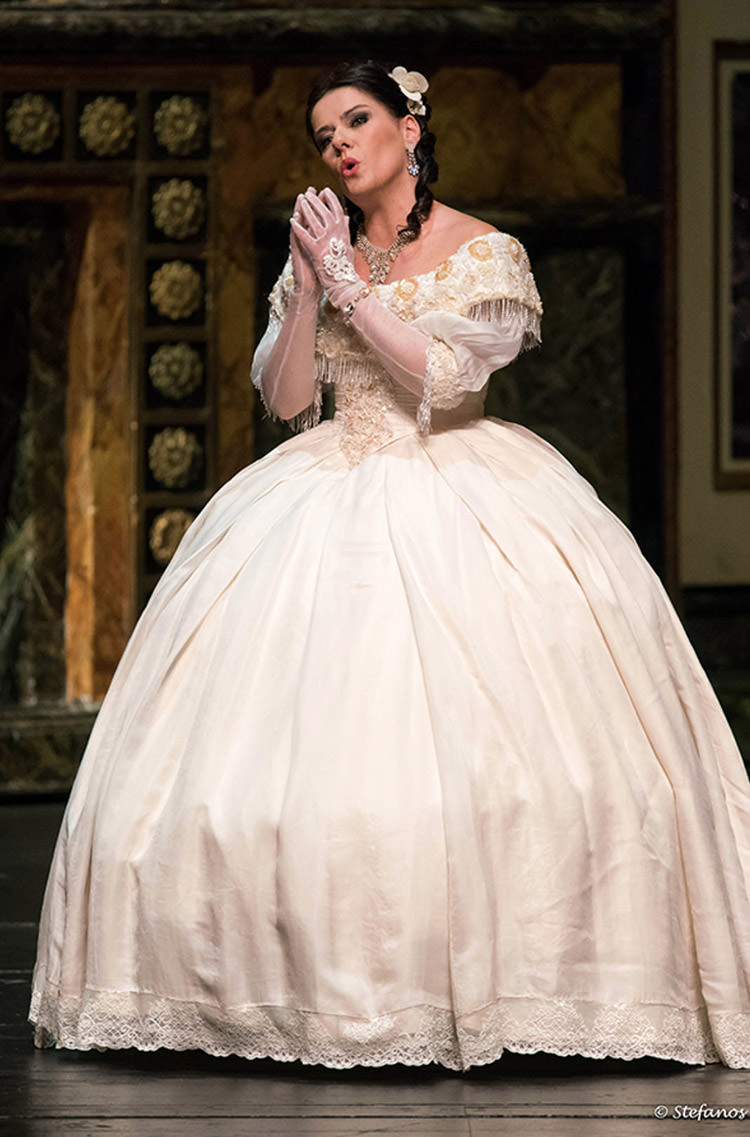
Vasiliki Karayanni in the role of Violetta in the opera 'La Traviata' by G. Verdi.
G.E.: How would you characterize our era? What would you like to see improved in the world?
B.K.: A very good and very difficult question.
There's much I would like to change. Firstly, as long as there's even one child dying of hunger on this planet, humanity has failed in my view. If this isn't corrected, nothing else can be achieved.
I am inherently optimistic and I try to see all aspects of everything I experience. And what we're living through now is a lesson. Maybe we don't immediately see what we're supposed to learn, especially when bad events occur, but in the long term, we see it. It might sound like I'm saying this from a safe distance, but a spark inside me tells me that something will happen, something will change, and I don't want to extinguish it. I don't know how long it will take, but I have a sense that something could change soon. What's very important, and what I'm asking for, is for people to remove the word "fear" from their vocabulary. We fear illness, we fear contact with others, we fear socializing, we fear sharing. We are slaves to our own experiences. For various reasons, they've tried to educate us in this, and they've succeeded to a great extent. Fear is not good. Fear holds us back. I want situations where the world doesn't fear. To be carefree, to breathe, to connect with nature, to love nature. It's different to be cautious and take precautions. That's protection. But when this need becomes excessive, it ceases to be protection. Then it's fear and slavery. I'm asking us to discard fear, especially the fear of death.
Another thing I consider important is to have knowledge and skepticism. Skepticism in the sense of filtering what's offered to us and not swallowing it without investigating. Knowledge is thus very important. Knowledge about the general, but also knowledge about oneself.
Lastly, there's one more thing I would like to change. I would like people to search and find romance within themselves. We need to break free from technology. To use it only as a tool, to serve us, rather than being its slaves, as we are now. For instance, we walk down the street and nearly stumble because we're answering a message. It won't make a difference if we reply to the message half an hour later. When these simple things are fixed, then we'll fix the rest, but for now, we lack the obvious. It's certainly sad to see all this, but I have a feeling that the world will change.
G.E.: Ms. Karayanni, I fully share your thoughts. I would like to focus on the issue of technology that you just mentioned. The truth is that I observe children growing up as prisoners of technology, causing them to lose their imagination, their innocence.
B.K.: Exactly. They lose their imagination, as you mentioned. They lose the power of their thoughts, which create images. When I was a little child, I had the luck and blessing to play in the yard with my friends, my cousins, with the neighborhood. I rode a bicycle, went to the sea. Simple things, which I feel my child hasn't experienced, because they are immersed in technology. Inevitably. I want to arrive at the importance of imagination. As children, we used to create our own stories and play them out, we were active, we went out in nature, we had memories of smells, sounds of nature. Nowadays, children don't have such memories. Of course, I want to believe that today's children have easier access to knowledge. Knowledge is very important. Knowledge and skepticism, as I mentioned earlier.
G.E.: One of my favorite operas is Mozart's Don Giovanni. If you allow me, I'd like to share a favorite phrase with you. The phrase that the statue of the unjustly killed Commendatore says to Don Giovanni when he wants to serve him dinner: "He who enjoys celestial nourishment has no need for mortal food." Ultimately, what gives meaning to life?
B.K.: Nice question. What we are experiencing now, we know that it is something temporary and perishable. However, a person is not only this perishable and temporary aspect. It's not just their body, but also their spirit, their soul. I believe that the Commendatore (the Commander) in the opera "Don Giovanni" refers precisely to this. He has departed from life, having been killed by Don Giovanni, but he continues to live. What is it that lives? His spirit lives on. What is this spirit? Hm, it originated from somewhere and is now somewhere else, having passed through life. It's very serious to seek this within oneself. The knowledge I mentioned earlier mainly pertains to this aspect.
In other words, let's ask ourselves: Who am I? Why am I here? Where did I come from and where am I going? It's lamentable that they provide us with things that concern only the perishable part of ourselves; in other words, we fear getting sick, fear death. But, we will die. Can anyone escape this? No one. Of course, we want to prolong it as much as we can, but we must try to remove from within us the fear of death. Essentially, if we think about it carefully, there is no death.
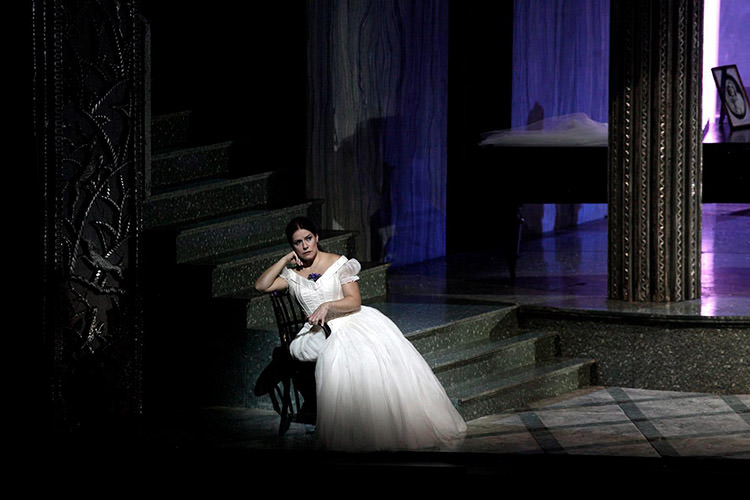
Vasiliki Karayanni in the role of Amina in the opera 'La Sonnambula' by V. Bellini.
G.E.: And loss?
B.K.: Loss, in the sense of parting or being parted, exists. However, if we think of time as a human creation for practical reasons, to be able to live in this passage here, then the period of separation can be very short. As long as you're alive, of course, the loss of a loved one is painful. Nevertheless, I believe there is a higher power, Christ, who taught us that what we are living now is just a passage. Here is where it's difficult, he tells us, but there we are better off. So, for me, this dinner to which Commendatore is invited by Don Giovanni, we need to explore it. To ask ourselves, where do we go after this? The knowledge we mentioned will help us. If one understands where they came from, then they can find an answer about where they're going. The ancient Greeks also tackled all of this. They analyze and present it beautifully through poetry, through their epics. We must seek it, seek this nourishment. Not to be consumed by the perishable part. Of course, the body is important, as our ancients said, "A healthy mind in a healthy body," but it's not just that. We are also spiritual beings, and spiritual nourishment is everything.
G.E.: How would you characterize your relationship with time?
B.K.: If you ask me whether I fear death, no, I don't. Aging, in terms of the body's response to daily activities, can be practical to observe, something that we can take care of, but when someone fears the death of their body, they neglect their spirit. And when they remember it – because their body will no longer serve them – it will be too late. We should be ready for this. Nevertheless, I am familiar with the notion of physical, bodily death. I don't believe in the death of the soul. I believe in the death of the spirit, something that can happen while we're alive. The spirit can die before the body, and that's very sad. It's a major illness of our times. Therefore, we must take care of and respect our bodies because they host our souls, but we must continuously nourish our spirits with knowledge.
G.E.: How easy or difficult do you think it is for us to forgive someone?
B.K.: It's easy (laughs).
G.E.: Even if someone tries to harm us?
B.K.: If someone wants to harm us, first and foremost, he hasn’t come to terms with himself. But it's not anyone's fault, it's our fault in what we allow. When we do harm to someone, we usually reflect our own needs, our own repressed desires. Of course, someone might want to harm us for various reasons. It's magnificent to be able to forgive them, and then the harm loses its power. It's about what we allow and how we perceive things. The harm someone might cause us is connected to how open we are to accept it and how we interpret it. We can prevent harm in a certain way. I'm not saying it's easy, of course. It takes work. If we maintain our composure, we look to find what led that specific person to harm us. Depending on the individual, we'll react accordingly.
G.E.: Is it possible for someone to distinguish truth from expediency and to navigate only with the truth?
B.K.: Of course, it's possible. A ally in this is knowledge. Knowledge and judgment. These are two elements that empower us.
G.E.: What pieces of advice from your parents have stayed indelible in your memory?
B.K.: The way I was brought up is something I always remember. They taught me to always strive to be fair and, most importantly, not to do to others what I wouldn't want them to do to me, not to allow it. Another thing they taught me is to never give up on my goals, to overcome obstacles, and not to be discouraged by adversities.
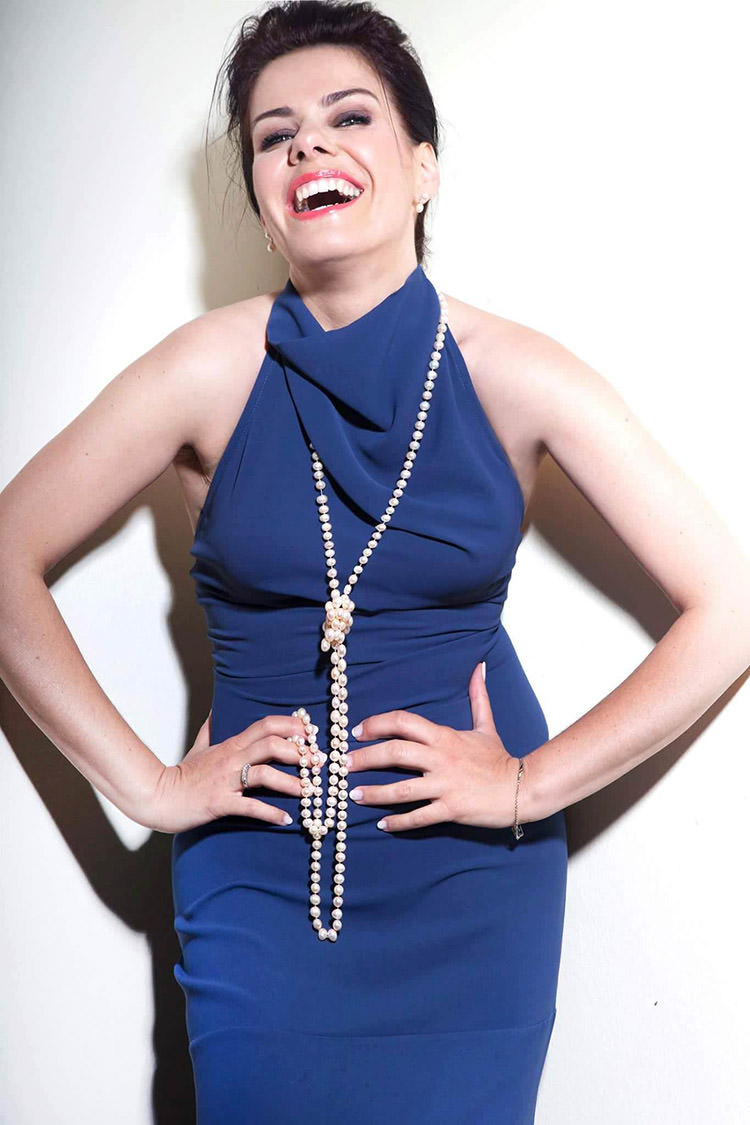
G.E.: If your life were the script of an opera, how would you like the ending to be?
B.K.: That's a very difficult question (laughter). Firstly, I would like to have answered certain questions. To know where I'll go. I would like to have maximized the time I've experienced here. To know that I've given my best in this passage of mine, leaving a mental and spiritual legacy for my child, and that would be the ending. I know that when someone has worked extensively on themselves on all levels, then the world will also be better. It's what you were mentioning earlier about forgiveness. It's important to know that we are not to blame for the harm others do to us. As for the ending, I wouldn't want to script it myself. That's Someone else's job up there. So, I can't answer it.
G.E.: Is there a verse from an opera or poetry that guides your life?
B.K.: "Vissi d’arte, Vissi d’amore." "I lived for art. I lived for Love," as Tosca says, but I would say for love in a broader sense. We can mean romantic love, but not only on a personal level. Love is everything and everywhere. It's in nature, in life, in friendships, in family.
G.E.: What advice would you give to a young person who wants to pursue opera, as well as art in general?
B.K.: I would tell him, welcome to a magical world! I would tell him that this world involves a lot of work, but if he loves it deeply, it won't feel like work. So, he should pursue it only if he truly loves it, so as not to be discouraged by the challenges that might arise. He should be persistent in order to achieve his maximum potential.
G.E.: Ms. Karayanni, our conversation truly has been a reflective journey for me. I thank you from the depths of my heart for this dialogue, and for the valuable gifts and emotions you offer us through your art. I hope that what was discussed in this conversation will serve as a starting point for meaningful contemplation and reconsideration for the readers.
B.K.: Thank you very much as well, Ms. Eftaxia. You also provided me with the nourishment for further discussion. I wish you success in your work!
Sort C.V.
Vassiliki Karayanni, a coloratura soprano, was born in Patras and started her studies in piano, accordion and in the theoretic courses at a Conservatory of the city. She achieved the diploma of Monody (Opera singer) with distinction and award from the National Conservatory, branch of Glyfada, while she continued her studies next to Joseph Metternich in Monaco.
From an early age, she started her cooperation with the Greek National Opera where she continues ceaselessly to perform the most representative roles in the coloratura soprano repertoire.
In 2012, she made her debut at Teatro alla Scala, Milan, performing the role of Olympia in the opera “The Tales of Hoffmann” by Jacques Offenbach, directed by Robert Carsen.
She has performed in some of the world’s greatest lyrical theaters, such as: Milan’s Teatro alla Scala, London’s Covent Garden’s Opera House, the Copenhagen Opera House, the Bunkamura Concert Hall of Tokyo, Tokyo’s Opera House, Biwako Hall at Otsu of Japan, at Berlin’s Comical Opera House, San Carlo in Naples, Florence State Opera, San Carlo Theater in Lisbon, Dusseldorf Opera, Soni Concert Hall in Tokyo, etc.
Her repertoire is extensive and includes many of the most representative roles of the Coloratura Soprano, such as: Glauce in Medea (Cherubini), Queen of the Night in the Magic Flute (Mozart), Olympia, Antonia, Giulietta, Stella in Hoffman’s Tales (Offenbach), Amina in La Sonnambula (The Sleepwalker) (Bellini), Marguerite in Faust (Gounod), Gilda in Rigoletto (Verdi), Violetta in Traviata (Verdi), Lucia in Lucia di Lammermoor (Donizetti), Constanze and Blonde in the Abduction from the Seraglio (Mozart), Adina in Elixir of Love (Donizetti), Norina in Don Pasquale (Donizetti), Zerbinetta in Ariadne in Naxos (R. Strauss), Rosina in the Barber of Seville (Rossini), Countess Adele in Count Ory (Rossini), etc.
She has sang in concerts in major halls such as New York’s Carnegie Hall, Queen Elizabeth Hall and London’s Cadogan Hall, Musashino Concert Hall in Tokyo, etc.
She has received the special award as new artist, by the Union of Greek Critics for Drama and Music regarding her performance in the role of Zerbinetta in Ariadne in Naxos of R. Strauss, in the production of the Greek National Opera. She has also received the special award of Ilva Ligabue in Italy.
She has recorded CDs and DVDs such as: The Barber of Seville of Paisiello, “Prayer” in poetry of K. Kavafis and music of Ath. Simoglou, “The Monogram” in poetry of Od. Elytis and music of G. Kouroupos etc.
In 2006, she had the honor to travel with the President of the Hellenic Republic, Konstantinos Stefanopoulos, in Brussels, and performed a recital to the Greek Embassy before the Belgian kings and on their honor.
On October of 2021, she sang the Olympic Anthem in the Stadium of Ancient Olympia, during the ceremony of Olympic Flame about the Olympic Games in Beijing 2022.
In the future, among others, she will sing at an opera Gala in Monte Carlo’s Opera.




